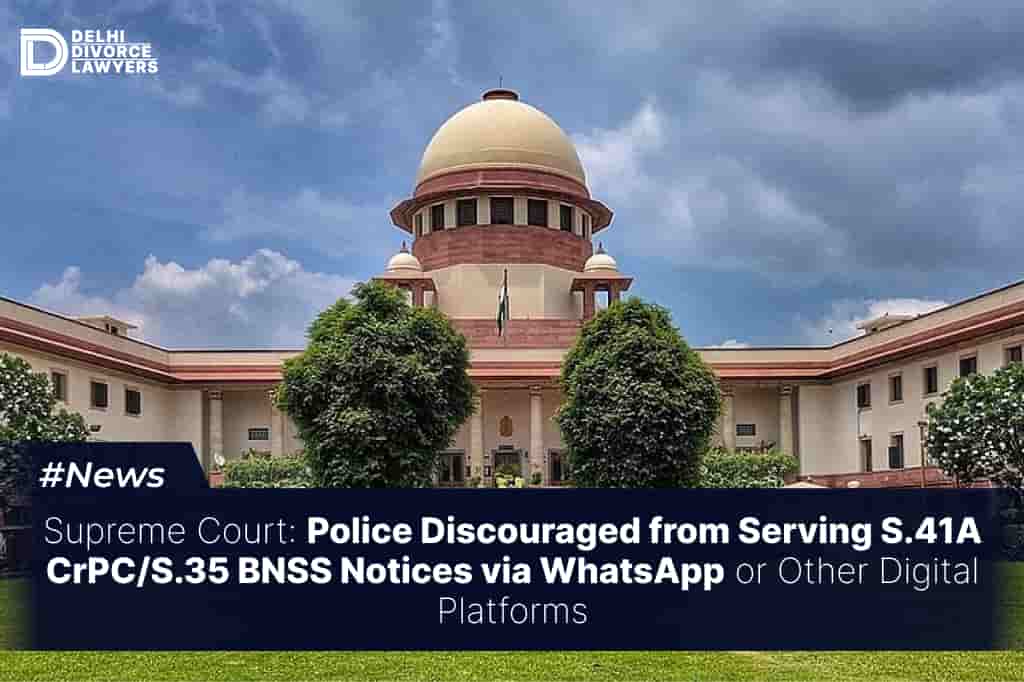The Supreme Court has ruled that appearance notices issued to accused persons or suspects under Section 41A of the Code of Criminal Procedure (CrPC) or Section 35 of the Bharatiya Nagarik Suraksha Sanhita (BNSS) should not be served via WhatsApp or other electronic means.
The Court emphasized that such methods cannot replace the service procedures prescribed under the CrPC, 1973, or the BNSS, 2023. Furthermore, it directed that notices under Section 160 of the CrPC/Section 179 of the BNSS and Section 175 of the CrPC/Section 195 of the BNSS must strictly comply with the service methods specified in the respective legislations.
These directions were issued by a bench comprising Justice MM Sundresh and Justice Rajesh Bindal in the case of Satender Kumar Antil v. CBI. The case aimed to establish guidelines to prevent unnecessary arrests and ensure bail for deserving undertrial prisoners. The Court has been actively monitoring the matter to ensure compliance with its directives by States and High Courts.
Senior Advocate Siddharth Luthra, serving as amicus curiae, highlighted the police practice of serving Section 41A CrPC notices via WhatsApp. He referred to a Standing Order dated January 26, 2024, issued by the Haryana DGP’s office, which allows police officers to serve notices under Section 41A of the CrPC, 1973, or Section 35 of the BNSS, 2023, either in person or through electronic means such as WhatsApp, email, SMS, or other digital platforms.
He highlighted that in its 2022 judgment in Satender Kumar Antil, the Supreme Court endorsed the Delhi High Court’s ruling in Rakesh Kumar v. Vijayanta Arya (DCP) & Ors., which explicitly stated that serving notices via WhatsApp or other electronic means is not permissible under Section 41A of the CrPC, 1973 (now Section 35 of the BNSS, 2023). Such methods fail to adhere to the procedures outlined in Chapter VI of the CrPC, 1973. Consequently, he argued that the police must strictly comply with the prescribed mode of service under Section 41A of the CrPC, 1973, or Section 35 of the BNSS, 2023, and refrain from using electronic platforms like WhatsApp to circumvent these requirements.
He further noted that while the new criminal code (BNSS) allows the use of electronic means for conducting trials and inquiries, it does not permit the service of electronic notices under Section 35 of the BNSS.
In light of this, the Court issued the following directions:
- a) All the States/UTs must issue a Standing Order to their respective Police machinery to issue notices under Section 41-A of CrPC, 1973/Section 35 of BNSS, 2023 only through the mode of service as prescribed under the CrPC, 1973/BNSS, 2023. It is made amply clear that service of notice through WhatsApp or other electronic modes cannot be considered or recognised as an alternative or substitute to the mode of service recognised and prescribed under the CrPC, 1973/BNSS, 2023.
- b) All the States/UTs while issuing Standing Orders to their respective Police machinery relating to Section 41-A of CrPC, 1973/Section 35 of BNSS, 2023 must be issued strictly in accordance with the guidelines issued by the Delhi High Court in Rakesh Kumar v. Vijayanta Arya (DCP) & Ors., 2021 SCC Online Del 5629 and Amandeep Singh Johar v. State (NCT Delhi), 2018 SCC Online Del 13448, both of which were upheld by this Court in Satender Kumar Antil v. CBI & Anr. (2022) 10 SCC 51.
- c) All the States/UTs must issue an additional Standing Order to their respective Police machinery to issue notices under Section 160 of CrPC, 1973/Section 179 of BNSS, 2023 and Section 175 of CrPC, 1973/Section 195 of BNSS, 2023 to the accused persons or otherwise, only through the mode of service as prescribed under the CrPC, 1973/BNSS, 2023.
The Court directed all High Courts to convene monthly meetings of their respective Committees for “Ensuring the Implementation of the Decisions of the Apex Court.” These meetings are aimed at ensuring compliance with the Supreme Court’s past and future directives at all levels and verifying that monthly compliance reports are being submitted by the relevant authorities.
The Registrar Generals of the High Courts and the Chief Secretaries of all States and Union Territories were instructed to implement these directions within three weeks from January 21. Additionally, Compliance Affidavits must be submitted within four weeks from January 21 to the designated email address: complianceinantil@gmail.com.
The matter is scheduled for further review on March 18, 2025, to assess compliance.

